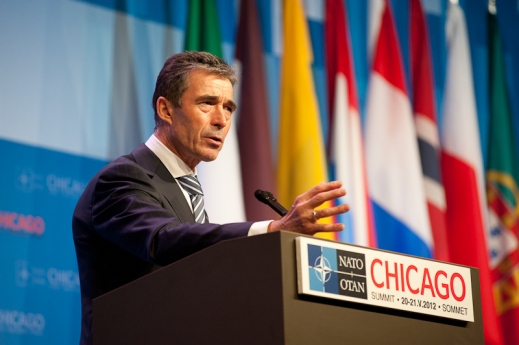New threats give alliance a new purpose
By Jared Angle
WASHINGTON –– New military and economic threats in Europe, Russia and the Middle East will reinvigorate the North Atlantic Treaty Organization, according to the military alliance’s top official.
Outgoing NATO Secretary General Anders Fogh Rasmussen spoke on July 7 at the Atlantic Council, a foreign policy research institute, in one of his final addresses to American audiences before the 2014 NATO Summit in Wales.

The speech preceded a meeting with President Barack Obama to prepare for the summit.
Today’s world ‘more competitive, dynamic, disorderly’
Warning of an “arc of instability” in the Middle East and North Africa, territorial disputes in Asia and a Russian threat to international order, Rasmussen called for greater cooperation between NATO members and suggested that the alliance will take on new members in the coming years.
“[Russia] has dealt a dangerous blow to the international rules-based system we have built up over decades,” Rasmussen said. “Its illegal and illegitimate actions encourage other autocratic regimes to follow suit.”
According to Rasmussen, these threats must be countered through increased transatlantic cooperation.
“Since World War Two, the solution to every strategic challenge has been transatlantic,” Rasmussen said.
Talking points included energy security, reversal of declining European defense budgets
Political and military issues alone are not the only threats facing European Union and NATO member countries, Rasmussen said.
Rasmussen’s speech echoed several points that French EU Commissioner Michel Barnier made during a June 12 speech in Washington at the Center for Strategic and International Studies.
Both leaders stressed the need for European nations to eliminate their dependence from Russian energy and to bolster national defense budgets.
According to Rasmussen, many European countries rely on Russian fossil fuels for electricity and heating – a reliance that makes those countries vulnerable to Russia’s handling of the energy supply chain.
Russia has demonstrated its ability to “turn off the taps” on natural gas supplies to Ukraine, Rasmussen said.
Russia’s state-owned natural gas company, Gazprom, has cut gas supplies to Ukraine several times in the past ten years, most recently in June 2014, according to the British Broadcasting Corporation.
Those cutoffs affected several EU nations, whose gas flows from Russia via Ukrainian pipelines.
Rasmussen advocated for energy diversification, saying that European countries are expanding fuel storage, build new pipelines and looking for new energy sources outside of Russia.
Rasmussen’s vision for an energy-independent Europe also included development of domestic energy resources.
“We must also find new ways to generate, extract and distribute energy, be that oil and gas, or renewables,” Rasmussen said.
In addition to aggressive Russian energy policies, Rasmussen said that he expects NATO members to “commit to change course on defense spending, to reverse the decline, and to back up that commitment with concrete action.”
Rasmussen applauded the efforts of Estonia, one of only three European NATO members to devote more than 2 percent of their national GDP to defense spending. Estonia spent €340 million ($462 million) on defense in 2012, according to the European Defence Agency.
Other European nations “can and should do more,” Rasmussen said, comparing NATO to an insurance policy where all members “must pay their premiums.”
The newest nations to buy into that policy could be the former Soviet republics of Moldova and Georgia, as well as the Balkan nation of Montenegro, according to Rasmussen.
While the three countries will not be invited to join NATO in the immediate future, NATO leaders will work on the next steps toward mid-level cooperation with those countries, falling short of full membership.

Push for a transatlantic trade agreement
Emphasizing a need for the transatlantic relationship to extend beyond military and political cooperation, Rasmussen described a “unique opportunity” to stimulate transatlantic trade.
“Trade encourages the creation of wealth. It discourages conflict and conquest,” Rasmussen said.
The Transatlantic Trade and Investment Partnership (TTIP) will open new markets and eliminate trade barriers between the U.S. and Europe, and could be the “biggest trade and investment deal in history,” Rasmussen said.
Rasmussen’s term at NATO ends on Sept. 30. Former Norwegian Prime Minister Jens Stoltenberg will assume the role of NATO’s 13th Secretary General in October.
Click here to view the Secretary General’s full speech on the Atlantic Council’s Youtube channel.